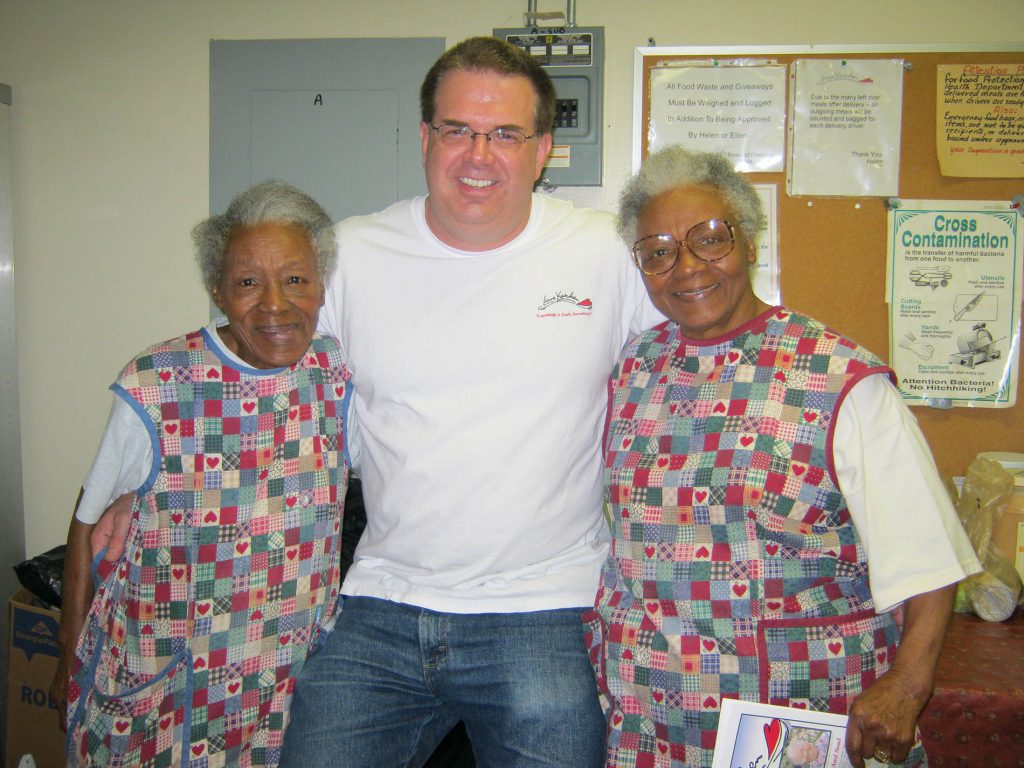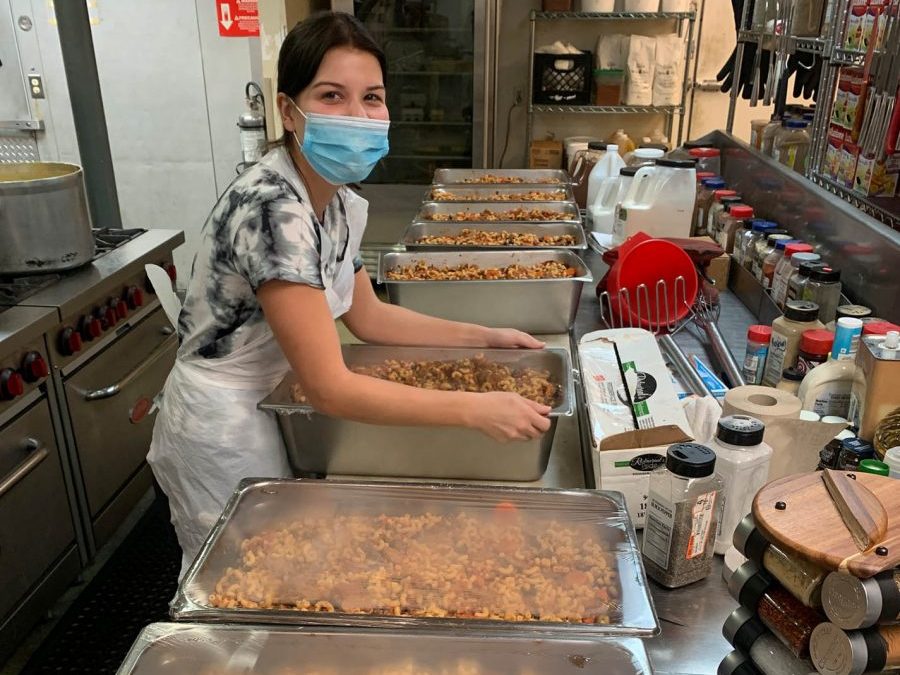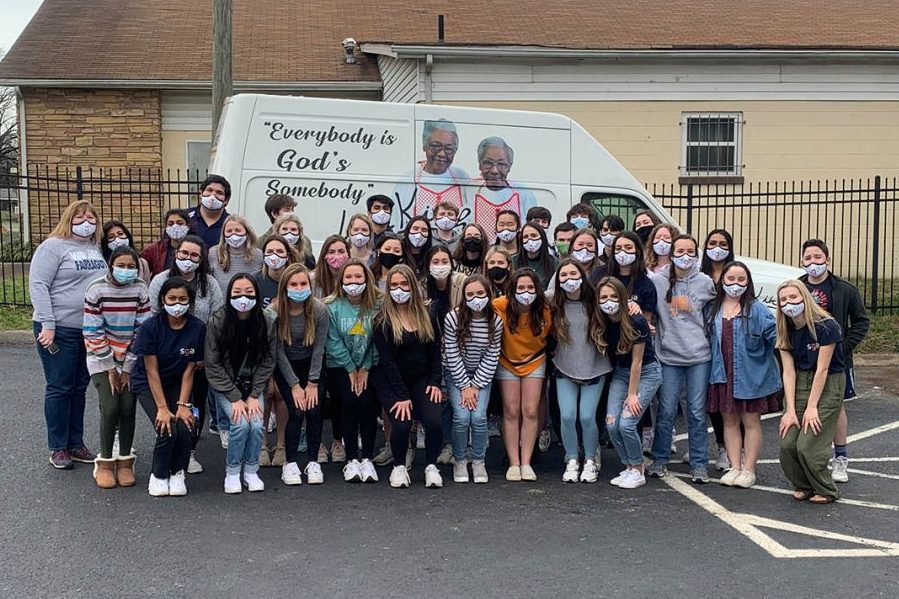The Love Kitchen’s all-volunteer team honors the memory of their founders by feeding their neighbors
It was 2001 when Patrick Riggins stepped foot inside the Love Kitchen for the first time. While he lived in Knoxville his entire life, the Love Kitchen was not something he knew existed. That is, until his brother-in-law started volunteering there. “He was picking up food donations from stores and he kept bugging me about it,” Riggins recalls with the laugh. “I got tired of hearing him and said, ‘If God wants me down there, he’ll put me there.’“
There must have been some bigger plans brewing, because not two weeks later, Riggins’ brother-in-law got a promotion, causing his schedule to change. “Can you go pick up for me until I can find someone else?” he asked. Riggins agreed.

He walked into the Love Kitchen and met the two sweetest ladies he had ever encountered: Helen Ashe and Ellen Turner. “I thought to myself, if these two ladies can make time for this, then I really have no excuse,” he recalls. So he started picking up food donations. Fast forward 20 years and Riggins continues with that work, except now he wears a new volunteer title: Executive Director.
Riggins’ fast fall for the Love Kitchen is not unlike many other introduction stories for volunteers who started when Helen and Ellen were alive. They walked in, met the sisters, and regardless of what their volunteer task was or had the potential to be, they fell in love. They wanted to be part of the work because of “the sisters,” as they were so often called. “Helen and Ellen, they wanted you here, if you wanted to be here,” Riggins says.
The sisters founded the Love Kitchen back in 1984. The two were nurses at the time, but seeing patients come in to the emergency waiting room who couldn’t afford to eat, weighed on them, Helen in particular. “She would go and feed them on her breaks,” Riggins says. When the two were advancing toward retirement, Helen shared with her sister what she felt was her calling in her next stage of life. She wanted to start a place where people could just come to eat, regardless of who they were or what life had handed them: “Whoever is hungry, we feed them.” Ellen shared in the excitement and joined Helen in the dream.
Today, 35 years after the Love Kitchen’s founding, that core mission remains. Every Thursday, dozens of volunteers arrive at the Love Kitchen on Martin Luther King Jr. Avenue and pick up meals to take to those who are elderly, disabled, or otherwise homebound throughout Knox and surrounding counties. Three different menus are prepared for the Thursday delivery day, and that day more than 3,000 meals go out the door. Each recipient receives seven meals for the week, and if they ask for more, they get them.

Volunteers come in throughout the week to prepare this enormous weekly feat. Mary Kerr, who began volunteering after retiring from teaching, now helps on Tuesdays to get that process going. “My job there is to make sure that all the volunteers that come in have a job,” she says. “I was made to feel so welcome when I came and so wanted and so needed and so appreciated, and I try to do that to everybody that comes.”
Similar to Riggins, Kerr’s introduction to the Love Kitchen in 2014 was a memorable one. After hearing the sisters speak at a banquet and asking them after their talk how someone could get involved, Helen, in the loving, down-to-earth tone everyone knew her for, said, “Well, baby, do you have time?” Kerr started crying, telling Helen that time was all she had now that she was retired. “Well, honey, you come on Thursday at 10 a.m.” She did and never left. “I just fell in love with them.”
Kerr walked in that first day to a woman slicing strawberries. Within minutes the woman had her wash her hands, get gloves and an apron on, and open the 42 cans of green beans from the pantry. The next week, Kerr got a “promotion” as she calls it. “They let me fry the bacon for the sisters.” There were three things the sisters loved: greasy crispy bacon, strawberries with strawberry sauce on them, and animal crackers. And to be the one to prepare and serve that to these two humble women was a big deal to volunteers. These are the memories they hold on to of the organization’s founders.
Today, Kerr spends Tuesdays working with volunteers to prepare for the work that will happen the remainder of the week, such as lunches on Wednesdays and Thursdays. “We used to serve it in house,” Riggins says, “but with COVID, we can’t do that now. Now we make the meals to go.” The meals go into containers and volunteers take them outside so that people can walk or drive up if they are in need of a meal. Each bag contains two lunches, and if it’s chilly outside during the pickup times, they will have hot cocoa or tea to take as well. More than 100 lunches are served each day.
After the meal pickup, the Love Kitchen opens up its doors for the Wednesday Market Pantry. “The sisters felt like, well if we are making food, we can serve whoever wants to come to eat, so that carried on,” Riggins explains. “Anything we don’t use in the meals, we put out in the dining room now.” Volunteers man a long line of tables filled with boxes of fresh fruits and vegetables, canned goods, bread, and desserts. Anyone who needs it can come to the pantry, and follow down the line, selecting the things they’d like to take home. Roughy 100 to 120 families come to pickup from the pantry each week.
Behind all of this work—the food preparation, the deliveries, securing food donations, manning pantry and pick up days—are people dedicated to this cause that the sisters worked so hard for. Not one person is paid for this work, not even Riggins. Everyone is a volunteer. A core group comes weekly to help and on any given day each week, core volunteers will train anyone new arriving to lend a hand. And there’s a humbleness that is ever present among them. Riggins is a computer programmer by day, but works and volunteers throughout his day at the Love Kitchen office. The organization’s secretary volunteers four days a week so that someone is available to field calls and inquiries. The chef volunteers four days a week to ensure the meals are being made. Roughly 40 to 50 volunteers are there working each week.
And even when COVID-19 seemed at its worst, Riggins says the volunteers kept coming back. Their services to the community never changed; in fact, the number of people reaching out to receive meals went up. And the volunteers heeded that call. “As the operation has grown and with COVID demand on resources, I kept thinking, ‘We’ll have to hire,’ and yet we never have to. We always have plenty of volunteers.”
While Riggins holds the Executive Director title and responsibilities, he remains one of the boots on the ground volunteers as well. He still picks up food donations every week, just as he did that first day more than 20 years ago. “I feel like this is what I’m supposed to be doing, and it feels great,” he says. Costco Wholesale is one of the key places that provides food donations for the organization, along with others like Panera Bread. “We buy less than half of the food we use.”

Funding for the remainder of the food comes exclusively from private donations, with little solicitation from the volunteer staff. “The sisters didn’t want to take government money. They always said that you work hard and try not to get on government charity. Provide for yourself because you’ll be happier and feel better if you do,” Riggins says. Because this was just who Helen and Ellen were.
Born in 1929 in South Carolina, the sisters were born to a sharecropping family, working since they were four or five years old. “They got up and would go to the ‘big house’ and wash clothes and clean in the kitchen, and then they would go to school,” Riggins says of the life stories they shared. “When they came home, evening chores would be to clean at the ‘big house.’” They worked hard from a very young age and carried important lessons from their father, John, throughout their lives.
Ellen passed away in 2015, Helen in 2018. And yet even though they are no longer physically part of the work, their spirit is felt by all who enter. The lessons they taught—lessons from their father—carry on in the hundreds who work with the Love Kitchen every year. Their father had three truths that volunteers like Riggins know by heart: “Theres’s only one father, the Heavenly Father; there’s only one race, the human race; and never take the last piece of bread off the table because someone might come along and need it.”
Riggins, Kerr, and so many other volunteers can recite these lessons as if they were their own. “I know they’re smiling down,” Kerr says. “I can just picture Helen saying to Ellen, ‘Look, baby, they’re feeding all these people.’”
The legacy of Helen Ashe and Ellen Turner lives on through the Love Kitchen and its team of volunteers. Riggins especially will never let the team forget how all this work began. After working for so many years with the sisters, he became almost like a grandson to the two. “As they got old, Helen said, ‘We’d like you to continue this and make sure that after we’re gone, that you keep this running,’” he says. “They left it in my hands, and I promised I would do it. So I’m doing it.”
To learn more about volunteering with or supporting the Love Kitchen, readers can visit thelovekitchen.org.

Comments are closed.